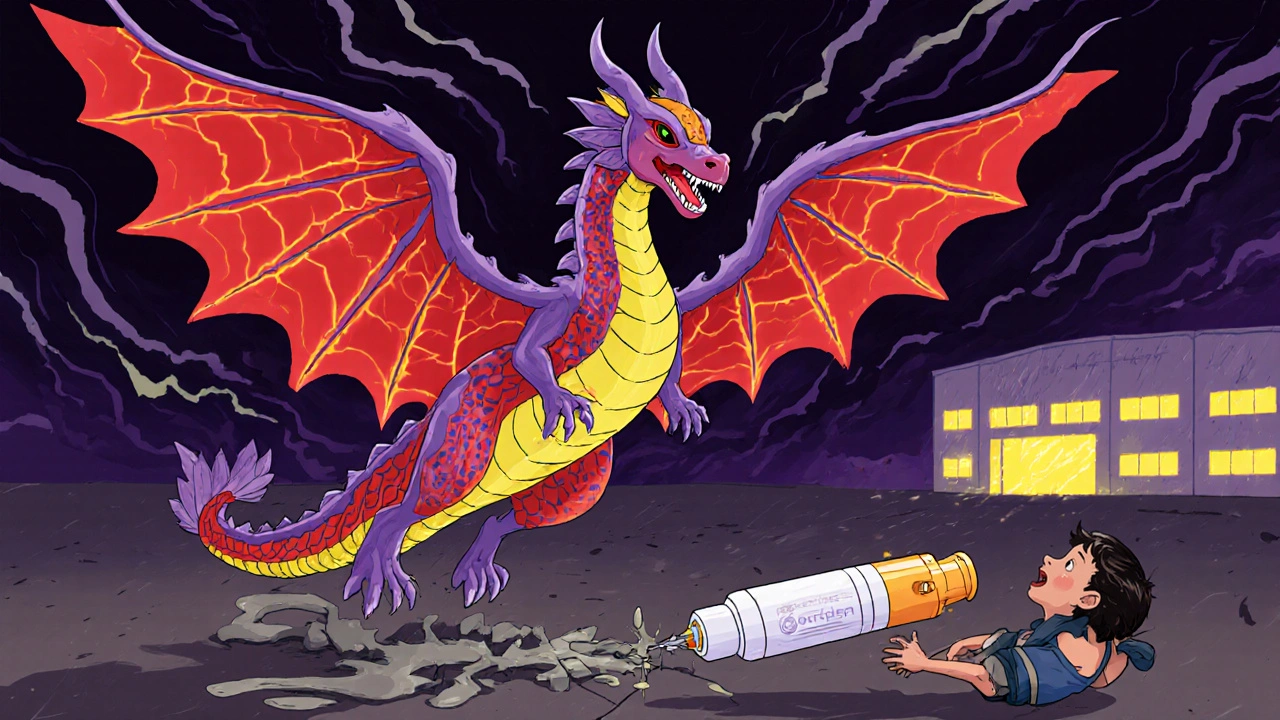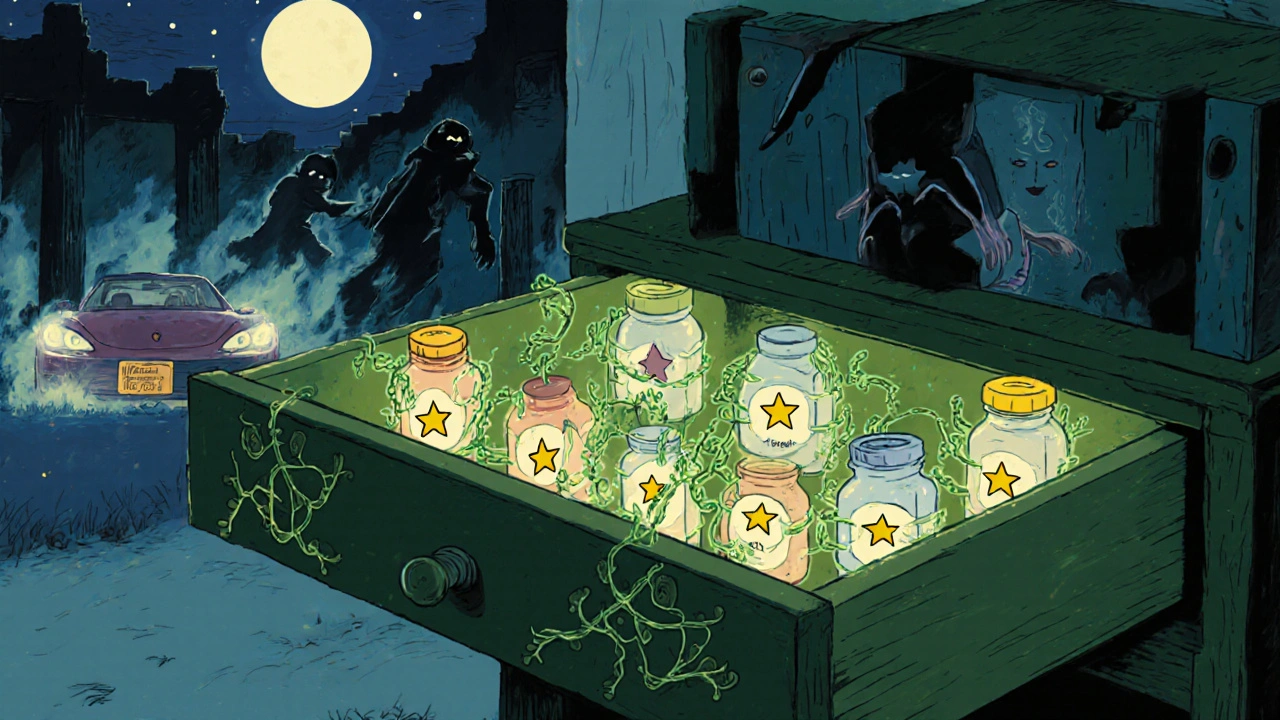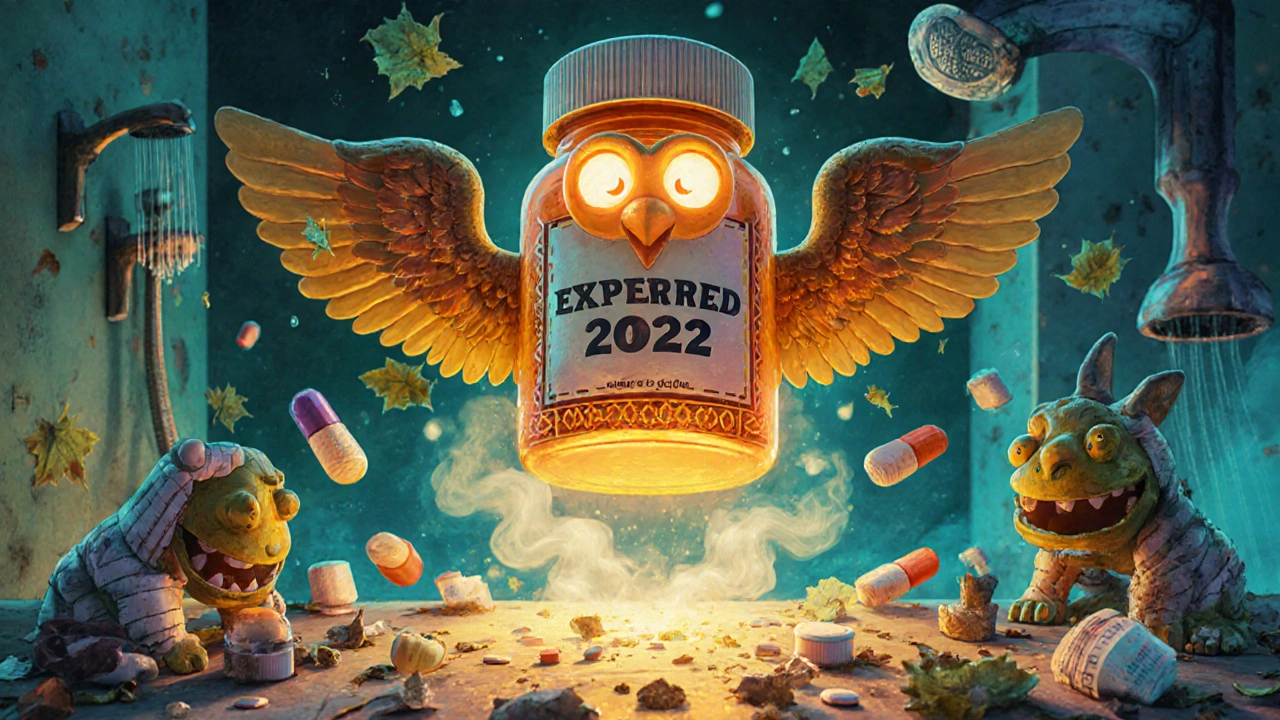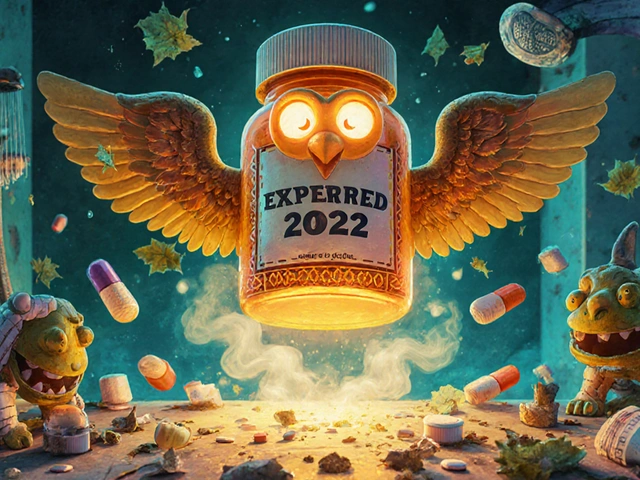Most people look at the expiration date on their medicine and think: expired means dangerous. But is that really true? You might have a bottle of ibuprofen from two years ago, or an old EpiPen tucked in your glove compartment. Should you throw it out? Or could it still work? The answer isn’t as simple as the label suggests.
What the Expiration Date Actually Means
The expiration date on your medicine isn’t a "use-by" date like milk. It’s the last day the manufacturer guarantees the drug will be at least 90% potent and completely safe under ideal storage conditions. That’s it. The U.S. Food and Drug Administration (FDA) has required these dates since 1979, based on stability testing done in labs under controlled temperature and humidity. Most drugs are tested at 25°C (77°F) and 60% humidity-conditions you’d find in a cool, dry closet, not your steamy bathroom.Manufacturers don’t test drugs for 10 or 20 years. They use accelerated testing: pushing drugs to 40°C and 75% humidity for six months to predict how they’ll degrade over time. Then they set the expiration date conservatively-often between 12 to 60 months after production. That’s not because the drug stops working after that date. It’s because the company can’t legally guarantee it beyond their test window.
What Happens to Medicine After It Expires?
Most solid medications-pills, capsules, tablets-don’t suddenly turn toxic after their expiration date. Instead, they slowly lose potency. A 2012 study from the NIH’s Shelf Life Extension Program tested over 3,000 lots of 122 different drugs, including antibiotics, painkillers, and heart medications. Nearly 90% were still effective 15 years past their expiration date when stored properly. Ciprofloxacin? 97% potent after 12 years. Amoxicillin? Still 94% effective after 8 years.That’s why the U.S. military extends expiration dates on stockpiled drugs. They save over $1.2 billion a year by doing it. But here’s the catch: those drugs are stored in climate-controlled warehouses, not on your bathroom counter. Heat, moisture, and light break down medicine faster. If your pills are in a hot car, or your insulin was left on a windowsill, the expiration date becomes meaningless.
When Expired Medicine Is Dangerous
Not all drugs are created equal. Some degrade in ways that make them risky, not just weak. Here are the big exceptions:- Nitroglycerin (for chest pain): Loses half its potency within 3-6 months after opening-even before expiration. Using an expired bottle during a heart attack could be fatal.
- Insulin: Degrades 1.5-2.5% per month if not refrigerated. A weakened dose won’t control blood sugar, leading to dangerous highs or lows.
- Liquid antibiotics (like amoxicillin suspension): Become ineffective after 14 days of mixing, regardless of the printed date. Bacteria can grow in them, making them unsafe.
- Epinephrine auto-injectors (EpiPens): Lose 15-20% potency per year after expiration. In an allergic emergency, that could mean not enough drug to save your life.
- Warfarin (blood thinner): Its effect becomes unpredictable when expired. Too little? Risk of clot. Too much? Risk of bleeding.
The Institute for Safe Medication Practices classifies these as high-risk medications. If you’re using any of these, don’t gamble. Replace them on time.

Storage Matters More Than You Think
Your medicine’s real shelf life depends on where you keep it. The FDA says to store medications in a cool, dry place. That means not the bathroom. The average humidity in a bathroom after a shower is 75-85%. That’s enough to make pills crumble, tablets stick together, or liquid meds grow mold.Keep your meds in their original bottles with child-resistant caps sealed. Avoid direct sunlight. Don’t transfer pills to pill organizers unless you’re using them within a week or two-those don’t protect against moisture or light.
If your medicine looks different, throw it out. Discoloration (white pills turning yellow), a weird smell, or pills that crumble when you touch them are signs of degradation. No amount of wishful thinking makes them safe.
When Is It Okay to Use an Expired Drug?
For non-critical, stable medications-like statins, antidepressants, or allergy pills-you might be fine using them a year or two past expiration if they’ve been stored well. But only if:- You’re not treating a life-threatening condition
- The drug hasn’t changed in appearance or smell
- You’re not relying on full potency (e.g., a mild headache, seasonal allergies)
Even then, it’s not ideal. The American Medical Association warns against using expired drugs for anything serious-like infections, heart conditions, or seizures. A 10% drop in antibiotic strength might not seem like much, but it could let bacteria survive and become resistant.
Dr. Joel Davis from Johns Hopkins says: "For chronic conditions like high blood pressure, an expired ACE inhibitor might still work short-term if you’re stuck without a refill." But he adds: "Don’t make this a habit. It’s a band-aid, not a solution."

What Should You Do With Expired Medicine?
Don’t flush it unless it’s on the FDA’s Flush List-things like fentanyl patches or oxycodone tablets that are deadly if misused. For most pills, the best option is a drug take-back program.The DEA runs National Prescription Drug Take-Back Days twice a year. In 2023 alone, over 5,800 collection sites across the U.S. collected nearly a million pounds of unused meds. Many pharmacies and police stations also have year-round drop boxes.
If you can’t get to a take-back site, mix pills with coffee grounds or cat litter, seal them in a container, and throw them in the trash. That makes them unappealing and hard to reuse.
What’s Changing in the Future?
The system is starting to evolve. The FDA is testing smart packaging with Bluetooth sensors that track temperature and humidity in real time. Imagine a pill bottle that tells you: "Your insulin is still good-it’s been kept at 5°C all month." Pilot programs show this could cut unnecessary waste by 22%.Researchers at the University of Utah are building machine learning models that predict how long a drug will last based on its storage history. Early results show 89.7% accuracy for common medications. This could lead to personalized expiration dates in the future-ones that change based on your actual conditions, not a factory guess.
Right now, 67 countries allow expiration date extensions for emergency stockpiles. Only 12% let consumers use expired meds at all. But with $765 billion wasted annually in the U.S. alone on expired drugs, pressure is growing to update the rules.
Bottom Line: Use Common Sense
Expiration dates are a safety net-not a death sentence. For most pills stored properly, they’re still safe and mostly effective years later. But for critical drugs like insulin, EpiPens, or antibiotics, don’t risk it. If you’re unsure, ask your pharmacist. They see expired meds every day and can tell you what’s worth keeping and what’s not.Don’t hoard old meds. Don’t ignore storage conditions. And don’t assume "expired" means "poison." It just means the guarantee is over. Your health isn’t worth guessing.
Is it dangerous to take expired medicine?
For most solid medications stored properly, expired medicine isn’t dangerous-it’s just less effective. But some drugs like insulin, epinephrine, nitroglycerin, and liquid antibiotics can become unsafe or ineffective after expiration, posing real health risks. Never use these if expired.
How long after expiration are pills still good?
Many pills remain potent for years beyond their expiration date if kept cool and dry. The FDA’s Shelf Life Extension Program found 88% of drugs tested were still effective 15 years later. But this only applies to stable drugs like ibuprofen, statins, or antihistamines-not liquids, injectables, or sensitive medications.
Where’s the best place to store medicine at home?
Store medicine in a cool, dry place away from sunlight and moisture-like a bedroom drawer or cabinet. Avoid the bathroom, kitchen, or car. Humidity and heat break down drugs faster. Keep them in original bottles with caps sealed to protect against air and moisture.
Can I use expired antibiotics?
No. Expired antibiotics may not kill all bacteria, which can lead to treatment failure and antibiotic resistance. Even if they look fine, their potency drops unpredictably. Never use expired antibiotics for infections-always get a new prescription.
Should I throw away expired EpiPens?
Yes. EpiPens lose 15-20% of their potency each year after expiration. In a life-threatening allergic reaction, even a small drop in dose can be deadly. Replace them on time. Many insurance plans cover replacements without a copay.
How do I dispose of expired medicine safely?
Use a drug take-back program if available-many pharmacies and police stations offer year-round drop boxes. If not, mix pills with coffee grounds or cat litter, seal them in a container, and throw them in the trash. Only flush drugs listed on the FDA’s Flush List (like fentanyl patches) to prevent accidental poisoning.
Why do expiration dates exist if drugs last longer?
Expiration dates are manufacturer guarantees, not scientific endpoints. Companies test drugs for a limited time and set conservative dates to avoid liability. They’re not designed to reflect how long the drug actually works-just when they can no longer promise full potency and safety under ideal conditions.
Do pharmacies have different expiration dates than the bottle?
Yes. Pharmacies apply a "beyond-use" date when dispensing medication-often one year for pills, 30 days for eye drops, and 14 days for liquid antibiotics. This is stricter than the manufacturer’s date because once opened, the drug is exposed to air, moisture, and handling.


My grandma kept her blood pressure pills past the date for years and never had an issue. She stored them in a drawer, never in the bathroom. Honestly, I think we’re over-scared of expiration dates. The system’s broken if we’re throwing out perfectly good medicine just because some label says so.
Let’s be clear: the FDA’s expiration dates are not suggestions-they’re legally binding stability thresholds established under rigorous, peer-reviewed protocols. To suggest otherwise is to undermine public health infrastructure. The military’s Shelf Life Extension Program operates under controlled, ISO-certified environments-conditions that do NOT replicate your car’s glove compartment. You are not a research lab. Your bathroom is not a climate-controlled warehouse. Do not conflate institutional logistics with personal negligence.
I grew up in a household where we never threw anything away-especially medicine. My mom kept her antihistamines from 2012 and used them during allergy season. She’d sniff them first-if they smelled funny, she’d toss them. If they looked normal? She’d take them. I know it sounds reckless, but I’ve seen her live to 82 with zero hospital visits for meds. Maybe we’ve lost touch with intuition? We’re so afraid of the label that we forget to listen to our bodies and our senses. And honestly? I think that’s sad.
Oh wow, so the FDA says drugs are still good 15 years later… but we’re still told to throw them out? That’s not science-that’s corporate liability wrapped in a white coat. And yet, somehow, we’re supposed to trust the same system that lets pharmaceutical companies charge $1,000 for insulin that’s been sitting in a warehouse for 10 years? The hypocrisy is breathtaking. They profit off the fear of expiration while quietly knowing most of it’s still potent. Meanwhile, people skip doses because they can’t afford new ones. And we call this healthcare?
They don’t want you to know this-but the expiration dates are a scam. Big Pharma and the FDA are in bed together. They don’t want you using old meds because then you wouldn’t buy new ones every year. That’s billions in lost sales. And don’t get me started on the ‘take-back programs’-they’re just a way to make you feel guilty while they incinerate perfectly good medicine. There’s a whole underground network of people who trade expired but still-effective drugs. It’s called survival.
Don’t be a dumbass. Expired EpiPens kill people. End of story. 🚫
It’s funny how we treat medicine like a loaf of bread-expiration date on the package, toss it if it’s past, no questions asked. But we don’t do that with anything else. We don’t throw out our car keys after a certain date. We don’t discard our house keys because they’re five years old. We don’t retire our favorite jacket because the tag says 2018. We assess. We inspect. We use judgment. Why do we outsource our common sense to a label printed by a corporation that doesn’t care if we live or die as long as they sell the next bottle? The real question isn’t whether expired drugs work-it’s why we’ve stopped thinking for ourselves.
Bro in India we use expired paracetamol all the time 😎 my uncle took 10-year-old antibiotics for a fever and lived to tell it. We don’t have money to throw away medicine. But we do have wisdom. If it looks okay, smells okay, and doesn’t make you vomit? It’s probably okay. 🤷♂️
Wait-so you’re telling me my 2018 ibuprofen is still good? I’ve been using it for migraines since then. I didn’t even know I was living on the edge. 😱 I feel like a genius. Also, I just found a bottle of Xanax from 2015 in my sock drawer. Should I take it before my Zoom meeting? 🤔
India has been doing this for decades. We don’t waste medicine. We check the color, smell, texture. If it’s fine, we use it. Why do Americans throw away perfectly good drugs? Because you’re rich enough to be wasteful. We don’t have that luxury. The FDA’s rules are for your country-not ours. And guess what? We’re still alive. 🇮🇳
Actually, pharmacies often put their own beyond-use dates on prescriptions-usually one year for pills, even if the manufacturer says five. That’s because once you open the bottle, exposure to air and moisture starts the clock. So even if your bottle says 2027, your pharmacy’s label says 2024? Go with the pharmacy. They’re the ones who dispensed it. Don’t overthink it. Just follow the smallest date.
My cousin’s a paramedic. She says if you’re out in the woods and your EpiPen expired six months ago and you’re having anaphylaxis? Use it. Better than nothing. But don’t go buying expired ones online and stocking up like it’s a survival game. That’s just dumb.